Related Research Articles
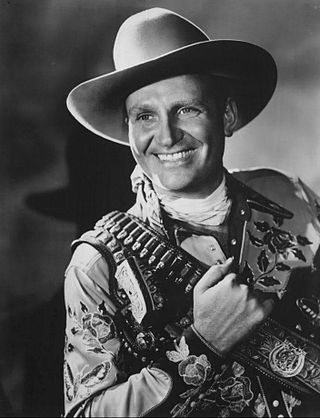
Orvon Grover "Gene" Autry, nicknamed the Singing Cowboy, was an American actor, musician, singer, composer, rodeo performer, and baseball team owner, who largely gained fame by singing in a crooning style on radio, in films, and on television for more than three decades, beginning in the early 1930s. During that time, he personified the straight-shooting hero — honest, brave, and true.
"Frosty the Snowman" is a popular Christmas song written by Walter "Jack" Rollins and Steve Nelson, and first recorded by Gene Autry and the Cass County Boys in 1950 and later recorded by Jimmy Durante in that year. It was written after the success of Autry's recording of "Rudolph the Red-Nosed Reindeer" the previous year. Rollins and Nelson shopped the new song to Autry, who recorded "Frosty" in search of another seasonal hit. Like "Rudolph", "Frosty" was subsequently adapted to other media including a popular television special.
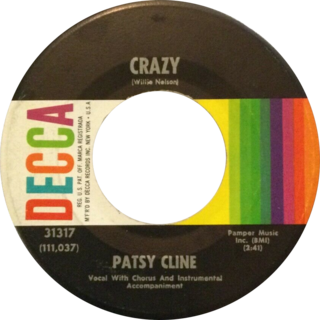
"Crazy" is a song written by Willie Nelson and popularized by country singer Patsy Cline in 1961. Nelson wrote the song while living in Houston, working for Pappy Daily's label D Records. He was also a radio DJ and performed in clubs. Nelson then moved to Nashville, Tennessee, working as a writer for Pamper Music. Through Hank Cochran, the song reached Patsy Cline. After her original recording and release, Cline's version reached number two on Billboard's Hot Country Singles, also crossing to the pop chart as a top 10 single.
"Buttons and Bows" is a popular song with music written by Jay Livingston and lyrics by Ray Evans. The song was published on February 25, 1948 by Famous Music Corp., New York. The song was written for and appeared in the Bob Hope and Jane Russell film The Paleface and won the Academy Award for Best Original Song. It was originally written with an Indian theme, but was changed when the director said that would not work in the movie. It was a vocal selection on many radio programs in late 1948. It was reprised in the sequel, Son of Paleface, by Roy Rogers, Jane Russell and Bob Hope. In 2004 it finished #87 in AFI's 100 Years...100 Songs survey of the top tunes in American cinema.
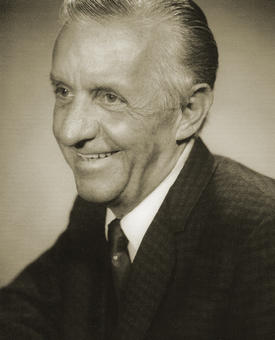
Walter E. "Jack" Rollins was an American musician born in Scottdale, Pennsylvania and raised in Keyser, West Virginia. Rollins wrote the lyrics to holiday favorites "Here Comes Peter Cottontail," "Frosty the Snowman," and "Smokey the Bear." The music was written by his partner Steve Nelson. Rollins co-wrote many country songs for artists such as Gene Autry, Hank Snow, George Jones, Eddy Arnold and Jimmy Durante.
"Run Rudolph Run" is a Christmas song written by Chuck Berry but credited to Johnny Marks and M. Brodie due to Marks's trademark on the character of Rudolph the Red-Nosed Reindeer. It was published by St. Nicholas Music (ASCAP) and was first recorded by Berry in 1958, released as a single on Chess Records.

Here Comes Peter Cottontail is a 1971 Easter stop-motion animated television special produced by Rankin/Bass Productions, currently distributed by Universal Television and based on the 1957 novel, The Easter Bunny That Overslept, by Priscilla and Otto Friedrich. The special is narrated by Danny Kaye, and stars Casey Kasem, Vincent Price, Joan Gardner and Paul Frees. The special also features Steve Nelson and Jack Rollins's Easter song, "Here Comes Peter Cottontail".
Peter Cottontail is a name temporarily assumed by a fictional rabbit named Peter Rabbit in the works of Thornton Burgess, an author from Sandwich, Massachusetts In 1910, when Burgess began his Old Mother West Wind series, the cast of animals included Peter Rabbit. Four years later, in The Adventures of Peter Cottontail, Peter Rabbit, unhappy at his plain-sounding name, briefly changed his name to Peter Cottontail because he felt it made him sound more important. He began putting on airs to live up to his important-sounding name, but after much teasing from his friends, soon returned to his original name, because, as he put it, "There's nothing like the old name after all." In the 26-chapter book, he takes on the new name partway through chapter 2, and returns to his "real" name, Peter Rabbit, at the end of chapter 3. Burgess continued to write about Peter Rabbit until his retirement in 1960, in over 15,000 daily syndicated newspaper stories, many of them featuring Peter Rabbit, and some of them later published as books, but "Peter Cottontail" is never mentioned again.

"It's Five O'Clock Somewhere" is a song performed by Alan Jackson and Jimmy Buffett, and written by Jim "Moose" Brown and Don Rollins. It was released in June 2003 as the lead single from Jackson's 2003 compilation album Greatest Hits Volume II. It spent eight non-consecutive weeks at #1 on Billboard Hot Country Songs in the summer of 2003, and ranked #4 on the year-end chart. In addition, the song peaked at #17 on the Billboard Hot 100 in September, and ranked #65 on the year-end Hot 100, making it the biggest pop hit for Jackson and the first top forty hit for Buffett since the 1970s.
"Faded Love" is a Western swing song written by Bob Wills, his father John Wills, and his brother, Billy Jack Wills. The tune is considered to be an exemplar of the Western swing fiddle component of American fiddle.
"Someday You'll Want Me to Want You" is a popular song published in 1944 by Jimmie Hodges. The song became a standard, recorded by many pop and country music singers.
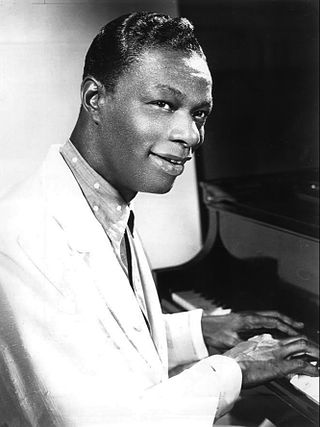
"Mona Lisa" is a popular song written by Ray Evans and Jay Livingston for the Paramount Pictures film Captain Carey, U.S.A. (1949), in which it was performed by Sergio de Karlo and a recurrent accordion motif. The title and lyrics refer to the renaissance portrait Mona Lisa painted by Leonardo da Vinci. The song won the Oscar for Best Original Song in 1950.

"Here Comes Santa Claus (Right Down Santa Claus Lane)" is a popular Christmas song written and originally performed by Gene Autry, with music composed by Oakley Haldeman. Autry's original recording (in which he pronounces Santa Claus as "Santy Claus") was a top-10 hit on the pop and country charts; the song would go on to be covered many times in the subsequent decades.
"The Wild Side of Life" is a song made famous by country music singer Hank Thompson. Originally released in 1952, the song became one of the most popular recordings in the genre's history, spending 15 weeks at number one on the Billboard country chart, solidified Thompson's status as a country music superstar and inspired the answer song, "It Wasn't God Who Made Honky Tonk Angels" by Kitty Wells.
Christmas with The Chipmunks is the name given to four different Christmas music albums by Alvin and the Chipmunks. These albums were released individually in 1962, 1963, 2007 and 2008.
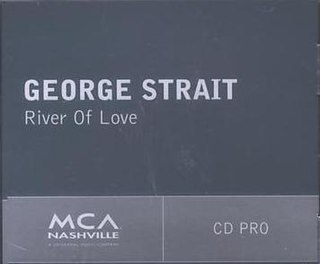
"River of Love" is a song written by Billy Burnette, Shawn Camp and Dennis Morgan, and recorded by American country music artist George Strait. It was released in November 2008 as the third single from the album Troubadour. The 87th single of his career, it is also his 80th Top Ten on the Billboard country charts, as well as his 44th and final Number One hit to date.
"The Race Is On" is a song written by Don Rollins and made a hit on the country music charts by George Jones and on the pop and easy listening charts by the unrelated Jack Jones. George's version was the first single released from his 1965 album of the same name. Released as a single in September 1964, it peaked at number three on the Billboard Hot Country Singles chart and at number 96 on the Billboard Hot 100 in January 1965. Jack's version topped Billboard's Easy Listening chart and reached number 15 on the Hot 100 the same year. The two recordings combined to reach number 12 on the Cashbox charts, which combined all covers of the same song in one listing and thus gave George Jones his only top-40 hit. The song uses thoroughbred horse racing as the metaphor for the singer's romantic relationships.
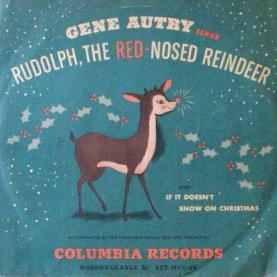
"Rudolph, the Red-Nosed Reindeer" is a song by songwriter Johnny Marks based on the 1939 story Rudolph the Red-Nosed Reindeer published by the Montgomery Ward Company. Gene Autry's recording hit No. 1 on the U.S. charts the week of Christmas 1949.
"Me Porto Bonito" is a song by Puerto Rican rapper Bad Bunny and Puerto Rican singer Chencho Corleone from the former's fifth studio album Un Verano Sin Ti (2022) featured as the fifth single, following "Callaíta", "Moscow Mule", "Tití Me Preguntó" and "Después de la Playa". The song was written by Benito Martínez and Orlando Valle but its production was handled by MAG, Súbelo NEO, La Paciencia and Lennex.
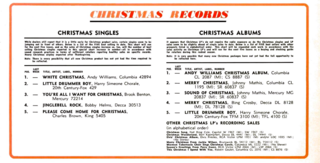
Billboard magazine only charted Christmas singles and albums along with the other popular non-holiday records until the 1958 holiday season when they published their first section that surveys only Christmas music.
References
- ↑ "Jack Rollins". Discogs .
- ↑ Whitburn, Joel (2008). Hot Country Songs 1944 to 2008. Record Research, Inc. ISBN 978-0-89820-177-2.